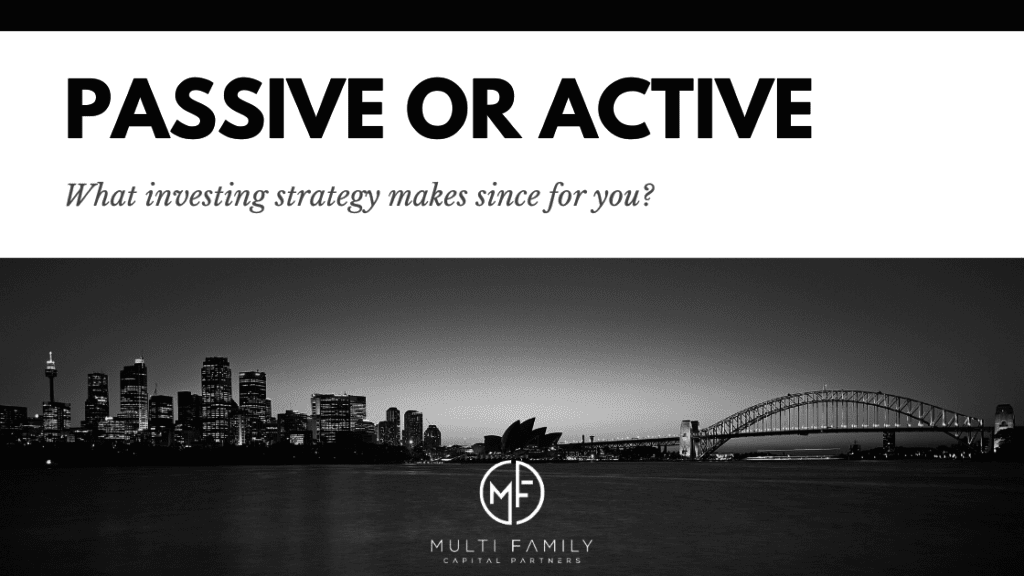Actively or Passively, What is the best way for you to invest?
Most real estate investors can be separated into two categories, passive investors and active investors. If you’re trying to determine the differences and which one is the best fit for you and your personal situation, hopefully this will help!
active real estate investing
Active investing is when an investor personally purchases a property for rental cash-flow or to fix and sell for a profit. The property could be anything from a single-family home to a large multifamily property. Active investors are involved in every aspect of the deal from finding it, obtaining financing, personally guaranteeing the loan and subsequently managing the investment.
Pro's
CONTROL
For some people, handling all the nitty gritty details of the investment process is imperative. They want to be able to decide when to sell, what rental rates should be, and what to improve on the property. Some want the ability to do some of that work by themselves so they can cut costs.
Profit
Because this person doesn’t share any of the responsibilities they don’t have to share any of the profits. This doesn’t mean they will be more profitable, only that they’ll keep a larger share of whatever profits are made.
con's
risk
Anytime someone is keeping all the profits they are also assuming all the risk. This means if something goes south, the solo active investor would absorb all the losses that occur.
Leverage
If the individual is the only capital source, whether that be cash or financing, they are likely limited on how many properties they can purchase. Instead of diversifying and spreading the risk across multiple investments, they put all the risk into 1 or 2 properties.
time
This is the return that most people don’t factor in. Real estate investing isn’t a set it up and leave it type on investment, it’s an enormous responsibility. They would need to handle everything during the purchase process such as the due diligence and loan process as well as everything during the hold period like maintenance, tenant placement and legal compliance. You can outsource some of that to property management companies but you’re still the main decision maker at the end of the day.
passive real estate investing
Passive investing is a hands-off approach which allows an investor to place one’s capital into a real estate syndication, like an apartment, that is managed in its entirety by a sponsor. Investing passively in private real estate means investors outsource the selection and management of investment properties to a sponsor. These sponsors pool funds from many investors to buy larger or an entire portfolio of properties, then execute specific business plans, run day-to-day operations and report back to investors.
Pro's
time
This is a passive investment, which means the only work involved should be choosing which operator or syndicator to partner with. No dealing with tenants or doing repairs. Also, instead of doing the repairs on your own to cut costs, you cut costs because the syndicators have negotiated discounted prices due over multiple properties.
risk
You get to receive a large share of the opportunities proceeds while relying on an expert to execute the business plan and handle the problems that will unquestionably arise. Also, the passive investor doesn’t incur any risk in regards to credit or liability. This is a major value-add for passive investors because it grants them access to low-cost debt financing through the operators track record without any of the associated risk.
returns
Because of the top two reasons above, the return profile might actually be similar to what an active investor may achieve on their own, but the passive approach doesn’t require the investors time once the investment has been made. To me, this is the strongest case to make for passive investing.
experience
In a relatively simple asset class like single-family residences, there isn’t a substantial difference between best-in-class owners and mom-and-pop owners. Therefore, an operator isn’t as valuable. However, in a 200+ unit multi-family apartment, which functions more like an operating business, an operator could provide invaluable systems, processes, relationships, and know-how, justifying their participation in the offering.
con's
control
Most passively syndicated investments don’t allow investors to maintain many voting rights, this is why due diligence on the operator is so critical. If the passive investors retained significant voting rights you’d be allowing capital to be controlled by other passive investors who are likely NOT experts when it comes to operations of the particular investment.
share of profits
Unlike active investing, the profits will be shared with other investors and the sponsors / operators who take a portion for their contribution to the deal. This doesn’t mean the investment will be less-profitable, only that profits will be split.
Which method is the best choice for you?
You’re the only person who can make that decision.
When choosing any investment I would suggest asking yourself what the ultimate goal is. Personally, I invest both passively and actively. I consider my active investments my day job and my passive investments my ability to diversify into different asset classes that I’m not the expert in.
have more questions about passive investments?
Reach out anytime! Click below to schedule a call or ask questions.
Click here


Pingback: Informed Investor Series: What Is Apartment Syndication – MF Capital Partners